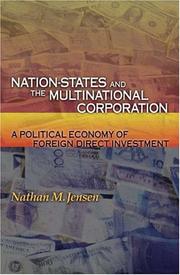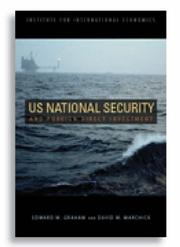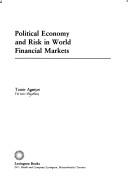| Listing 1 - 6 of 6 |
Sort by
|
Book
ISBN: 1282077732 9786612077739 1846731127 9781846731129 Year: 2008 Publisher: London : Blue Ibex Ltd.,
Abstract | Keywords | Export | Availability | Bookmark
 Loading...
Loading...Choose an application
- Reference Manager
- EndNote
- RefWorks (Direct export to RefWorks)
his professional handbook provides up-to-date analysis of the risks involved in trading with, or investing in 155 countries. Individual country profiles include a description of strengths and weaknesses, information on conditions for market access, foreign exchange regulations and attitudes for foreign investors, and main economic indicators, such as import-export data, private/public consumption breakdown, standard of living, and purchasing power statistics. Each country is also given a unique risk rating. In addition, the book also provides a series of authoritative industry sector and regio
Book
ISBN: 9780203107096 9781136260711 9781136260667 9781136260704 9780415671972 9781138843387 0415671973 Year: 2013 Publisher: Abingdon Routledge
Abstract | Keywords | Export | Availability | Bookmark
 Loading...
Loading...Choose an application
- Reference Manager
- EndNote
- RefWorks (Direct export to RefWorks)
"In recent years, the world has witnessed the coming of age of international investment law. The numbers are telling with over 2600 bilateral investment treaties, over 462 free trade, customs unions and other economic partnership agreements notified to the WTO, with 276 being in force, an increasing number of which include investment chapters, and over 350 known investor-State treaty-based arbitrations. This phenomenon has not left many untouched as over 175 States have signed international investment agreements (IIAs) and at least 81 governments have faced investment treaty arbitrations. The regime, however, has not been without criticisms. The main criticisms being: that IIAs do not fulfil their great bargain the promotion of investment, while they effectively protect powerful economic interests; that IIAs protect investor's rights over the public interest of the host country; that the dispute settlement system put in place by IIAs lacks legitimacy due to the fundamentally ad hoc nature of investor-State arbitration; and that the complexity and cost of the system are out of control.This book takes stock of developments in international investment law and analyzes potential solutions to some of these criticisms from the perspective of international public policy, in negotiations, substantive obligations and dispute resolution. The book is prepared by a group of scholars and practitioners from Canada and Europe. It takes a multidisciplinary approach to the subject, with analysis from the legal, political and economic perspectives. The first part of the book traces the evolution in IIA treaty-making and provides an evaluation from a political economy and economics perspective. The other three parts are organised around the concepts of efficiency, legitimacy and sustainability. Each contributor analyzes one or more issues of treaty negotiation, substance or dispute resolution, with the ultimate aim of improving IIA treaty-making in these respects."-- "This book presents the reflections of a group of researchers interested in assessing whether the law governing the promotion and protection of foreign investment reflects sound public policy. Whether it is the lack of "checks and balances" on investor rights or more broadly the lack of balance between public rights and private interests, the time is ripe for an in-depth discussions of current challenges facing the international investment law regime. Through a survey of the evolution in IIA treaty-making and an evaluation from different perspectives, the authors take stock of developments in international investment law and analyze potential solutions to some of the criticisms that plague IIAs. The book takes a multidisciplinary approach to the subject, with expert analysis from legal, political and economic scholars. The first part of the book traces the evolution of IIA treaty-making whilst the other three parts are organised around the concepts of efficiency, legitimacy and sustainability. Each contributor analyzes one or more issues related to substance, treaty negotiation, or dispute resolution, with the ultimate aim of improving IIA treaty-making in these respects. Improving International Investment Agreements will be of particular interest to students and academics in the fields of International Trade Law, Business and Economics"--
International finance --- Economic law --- Investments, Foreign --- Capital exports --- Capital imports --- FDI (Foreign direct investment) --- Foreign direct investment --- Foreign investment --- Foreign investments --- International investment --- Offshore investments --- Outward investments --- Capital movements --- Investments --- Economic aspects --- Government policy --- Law and legislation --- Political aspects --- Investments, Foreign - Law and legislation --- Investments, Foreign - Political aspects --- Investments, Foreign - Economic aspects --- Investments, Foreign - Government policy

ISBN: 0691122229 069113636X 1400837375 1282964631 9786612964633 9780691136363 9780691122229 9781400837373 Year: 2006 Publisher: Princeton Princeton university press
Abstract | Keywords | Export | Availability | Bookmark
 Loading...
Loading...Choose an application
- Reference Manager
- EndNote
- RefWorks (Direct export to RefWorks)
What makes a country attractive to foreign investors? To what extent do conditions of governance and politics matter? This book provides the most systematic exploration to date of these crucial questions at the nexus of politics and economics. Using quantitative data and interviews with investment promotion agencies, investment location consultants, political risk insurers, and decision makers at multinational corporations, Nathan Jensen arrives at a surprising conclusion: Countries may be competing for international capital, but government fiscal policy--both taxation and spending--has little impact on multinationals' investment decisions. Although government policy has a limited ability to determine patterns of foreign direct investment (FDI) inflows, political institutions are central to explaining why some countries are more successful in attracting international capital. First, democratic institutions lower political risks for multinational corporations. Indeed, they lead to massive amounts of foreign direct investment. Second, politically federal institutions, in contrast to fiscally federal institutions, lower political risks for multinationals and allow host countries to attract higher levels of FDI inflows. Third, the International Monetary Fund, often cited as a catalyst for promoting foreign investment, actually deters multinationals from investment in countries under IMF programs. Even after controlling for the factors that lead countries to seek IMF support, IMF agreements are associated with much lower levels of FDI inflows.
Country risk. --- International business enterprises -- Government policy. --- International Monetary Fund. --- Investments, Foreign -- Political aspects. --- Investments, Foreign --- International business enterprises --- Investissements étrangers --- Entreprises multinationales --- Risque pays --- Political aspects --- Government policy. --- Aspect politique --- Politique gouvernementale --- Country risk, Political --- Political risk (Foreign investments) --- 462 Economisch beleid --- Risk --- Political aspects. --- Internationaal monetair fonds --- International monetary fund --- Country risk --- 339.113 --- AA / International- internationaal --- Government policy --- Buitenlandse investeringen --- IMF. --- E-books

ISBN: 0881323918 9780881323917 9786611060930 0881324744 1281060933 1435609190 9781435609198 9780881324747 9781281060938 6611060936 Year: 2006 Publisher: Washington, D.C. Institute for International Economics
Abstract | Keywords | Export | Availability | Bookmark
 Loading...
Loading...Choose an application
- Reference Manager
- EndNote
- RefWorks (Direct export to RefWorks)
International finance --- United States --- investissements etrangers --- verenigde staten --- Investments, Foreign --- -National security --- -332.67373 --- National security --- National security policy --- NSP (National security policy) --- Security policy, National --- Economic policy --- International relations --- Military policy --- Capital exports --- Capital imports --- FDI (Foreign direct investment) --- Foreign direct investment --- Foreign investment --- Foreign investments --- International investment --- Offshore investments --- Outward investments --- Capital movements --- Investments --- buitenlandse investeringen --- états-unis --- Political aspects --- Government policy --- Investments, Foreign -- Political aspects -- United States. --- National security -- United States. --- Investment & Speculation --- Finance --- Business & Economics --- Homeland defense --- Homeland security --- 332.67373 --- United States of America --- Political aspects.
Book
ISBN: 1451917686 146237090X 9786612844065 145187345X 1452777306 1282844067 Year: 2009 Publisher: Washington, D.C. : International Monetary Fund,
Abstract | Keywords | Export | Availability | Bookmark
 Loading...
Loading...Choose an application
- Reference Manager
- EndNote
- RefWorks (Direct export to RefWorks)
This paper estimates the magnitude of key effects on the real economy from financial sector stress. We focus on the short-run feedback effect from market-based indicators of financial sector risk to the real economy through the credit channel, and estimate this effect on an economy-wide (macro) level, as well as on the level of individual large banks. Both estimates yield significant feedback effects of substantial magnitude. The estimates are consistent with other work in this area. Our results suggest that prudential supervision could be enhanced by taking into account the feedback effects of financial instability in the real economy. We also propose a way to integrate feedback effects into stress tests in order to improve realism and accuracy or macroeconomic stress scenarios, as well as a metric to interpret stress testing results.
Financial risk. --- International business enterprises -- Management. --- Investments, Foreign -- Political aspects -- Evaluation. --- Risk management. --- Management --- Business & Economics --- Management Styles & Communication --- Economic development. --- Business risk (Finance) --- Money risk (Finance) --- Development, Economic --- Economic growth --- Growth, Economic --- Risk --- Economic policy --- Economics --- Statics and dynamics (Social sciences) --- Development economics --- Resource curse --- Banks and Banking --- Finance: General --- Money and Monetary Policy --- Industries: Financial Services --- Monetary Policy, Central Banking, and the Supply of Money and Credit: General --- Financial Institutions and Services: General --- General Financial Markets: Government Policy and Regulation --- Banks --- Depository Institutions --- Micro Finance Institutions --- Mortgages --- Monetary economics --- Finance --- Banking --- Credit --- Financial sector --- Financial sector risk --- Bank credit --- Financial services industry --- Financial risk management --- Banks and banking --- Switzerland

ISBN: 0669083399 9780669083392 Year: 1985 Publisher: Lexington Lexington Books
Abstract | Keywords | Export | Availability | Bookmark
 Loading...
Loading...Choose an application
- Reference Manager
- EndNote
- RefWorks (Direct export to RefWorks)
International finance --- Investments, Foreign --- Risk. --- Political aspects. --- AA / International- internationaal --- LDC / Developping Countries - Pays En Développement --- 347.720.1 --- 382.256 --- 339.113 --- 339.115 --- 338.341.1 --- 333.841 --- 382.254 --- 333.109 --- 339.4 --- Aard, definitie, eigenschappen van handelsvennootschappen. Bedrijfspatrimonium. Multinationale bedrijven. --- Buitenlandse hulp (betalingsbalans). --- Buitenlandse investeringen. --- Buitenlandse schuld. Debt Equity Swap in LDC. --- Financiële hulp aan de Derde Wereld. --- Inflatie. --- Internationale kredieten. --- Veiligheid. Bankovervallen. Bankrisico's. --- Vermogensbeheer. Financiële analyse. Verspreiding van de beleggingsrisico's. --- Risk --- Economics --- Uncertainty --- Probabilities --- Profit --- Risk-return relationships --- International monetary system --- International money --- Finance --- International economic relations --- Political aspects --- Veiligheid. Bankovervallen. Bankrisico's --- Inflatie --- Financiële hulp aan de Derde Wereld --- Buitenlandse investeringen --- Buitenlandse schuld. Debt Equity Swap in LDC --- Vermogensbeheer. Financiële analyse. Verspreiding van de beleggingsrisico's --- Aard, definitie, eigenschappen van handelsvennootschappen. Bedrijfspatrimonium. Multinationale bedrijven --- Internationale kredieten --- Buitenlandse hulp (betalingsbalans) --- International finance - Political aspects. --- Investments, Foreign - Political aspects.
| Listing 1 - 6 of 6 |
Sort by
|

 Search
Search Feedback
Feedback About UniCat
About UniCat  Help
Help News
News